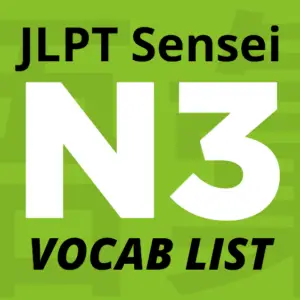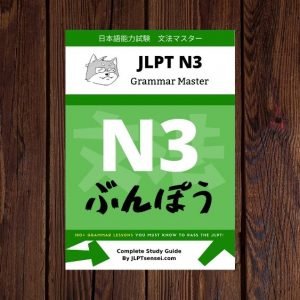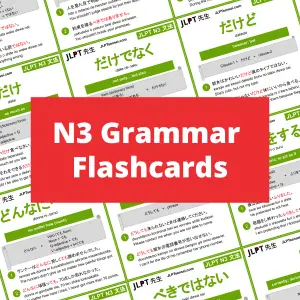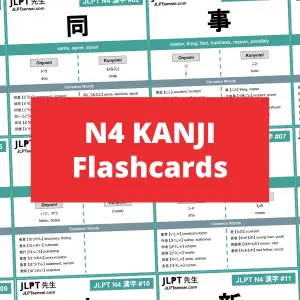
This is a list of the vocabulary that you need to know in order to pass the JLPT N3. In total, you will need to have a vocabulary of about 3,750 words.
This list includes lessons for the most common and important words for you to know, all listed in alphabetical order.
See our full study guide for how to pass the JLPT N3.
- See all JLPT N3 nouns
- Sell all JLPT N3 verbs
- Sell all JLPT N3 adverbs
- See all JLPT N3 adjectives
- See all JLPT N3 particles

| # | 語彙 | Vocabulary | Type | Meaning |
|---|---|---|---|---|
| 101 | 急激 | kyuugeki きゅうげき | Adjective, な-adjective | sudden; abrupt; rapid; sharp; drastic; radical |
| 102 | 急に | kyuuni きゅうに | Adverb | swiftly; rapidly; quickly; immediately; hastily |
| 103 | 吸収 | kyuushuu きゅうしゅう | Noun, Verb, Suru verb | absorption; suction; attraction |
| 104 | 急速 | kyuusoku きゅうそく | Noun, Adjective, な-adjective | rapid (e.g. progress) |
| 105 | 真面目 | majime まじめ | Noun, Adjective, な-adjective | serious; earnest |
| 106 | 真っ赤 | makka まっか | Noun, Adjective, な-adjective | bright red; deep red; flushed (of face) |
| 107 | 学ぶ | manabu まなぶ | Verb, Godan verb, Transitive verb | to study (in depth); to learn; to take lessons in |
| 108 | 万一 | manichi まんいち | Noun, Adverb | emergency; unlikely event; by some chance; by some possibility |
| 109 | 満足 | manzoku まんぞく | Noun, Adjective, な-adjective, Verb, Suru verb | satisfaction; contentment; sufficient; enough |
| 110 | 明確 | meikaku めいかく | Adjective, な-adjective | clear; precise; definite; distinct |
| 111 | 飯 | meshi めし | Noun | cooked rice; meal |
| 112 | 味方 | mikata みかた | Noun, Verb, Suru verb | friend; ally; supporter; taking sides with; supporting |
| 113 | 魅力 | miryoku みりょく | Noun | charm; fascination; glamour; attraction; appeal |
| 114 | 木曜 | mokuyou もくよう | Noun, Adverbial Noun | Thursday |
| 115 | 半ば | nakaba なかば | Noun, Adverbial Noun, Suffix, Adverbial noun | middle; half; semi; halfway; partly |
| 116 | 熱心 | nesshin ねっしん | Noun, Adjective, な-adjective | enthusiastic; eager |
| 117 | 日本 | nihon にほん | Noun | Japan |
| 118 | 能力 | nouryoku のうりょく | Noun | ability; faculty |
| 119 | 入場 | nyuujou にゅうじょう | Noun, Verb, Suru verb | entrance; admission; entering |
| | ||||
| 120 | お昼 | ohiru おひる | Noun | lunch; midday; daytime |
| 121 | 収める | osameru おさめる | Verb, Ichidan verb, Transitive verb | to supply; to dedicate; to make an offering; to pay |
| 122 | 連続 | renzoku れんぞく | Noun, Verb, Suru verb | continuation; succession; series |
| 123 | 利益 | rieki りえき | Noun, Verb, Suru verb | profit; gains; benefit |
| 124 | 利口 | rikou りこう | Noun, Adjective, な-adjective | clever; intelligent; wise; bright; sharp |
| 125 | 留学 | ryuugaku りゅうがく | Noun, Verb, Suru verb | studying abroad |
| 126 | 作品 | sakuhin さくひん | Noun | work of art; performance |
| 127 | 左右 | sayuu さゆう | Noun, Verb, Suru verb | left and right |
| 128 | 成長 | seichou せいちょう | Noun, Verb, Suru verb | growth; development; growing up; becoming an adult |
| 129 | 製品 | seihin せいひん | Noun | manufactured goods; finished goods; product |
| 130 | 青年 | seinen せいねん | Noun | youth; young man |
| 131 | 刺激 | shigeki しげき | Noun, Verb, Suru verb | stimulus; impetus; incentive; encouragement; motivation; provocation; excitement; thrill |
| 132 | 資本 | shihon しほん | Noun | funds; capital |
| 133 | 品 | shina しな | Noun | article; item; thing; goods; stock; quality |
| 134 | 身長 | shinchou しんちょう | Noun | body height; stature |
| 135 | 進学 | shingaku しんがく | Noun, Verb, Suru verb | entering a higher-level school (often university) |
| 136 | 新鮮 | shinsen しんせん | Adjective, な-adjective | fresh |
| 137 | 支店 | shiten してん | Noun | branch office; branch store |
| 138 | 使用 | shiyou しよう | Noun, Verb, Suru verb | use; application; employment; utilization. |
| 139 | 食品 | shokuhin しょくひん | Noun | food; food products |
| 140 | 書物 | shomotsu しょもつ | Noun | book; volume |
| 141 | 書類 | shorui しょるい | Noun | document; official papers |
| 142 | 書斎 | shosai しょさい | Noun | study; library; den; home office; reading room |
| 143 | 商売 | shoubai しょうばい | Noun | trade; business; commerce; transaction; occupation |
| 144 | 奨学金 | shougakukin しょうがくきん | Noun | scholarship; stipend; student loan |
| 145 | 正午 | shougo しょうご | Noun, Adverbial Noun | midday |
| 146 | 商品 | shouhin しょうひん | Noun | commodity; article of commerce; goods; stock; merchandise |
| 147 | 少女 | shoujo しょうじょ | Noun | little girl; maiden; young lady |
| 148 | 証明 | shoumei しょうめい | Noun, Verb, Suru verb | proof; verification; certification |
| 149 | 少年 | shounen しょうねん | Noun | boy; juvenile; young boy; youth; lad |
| | ||||
| 150 | 少々 | shoushou しょうしょう | Noun, Adverbial Noun | just a minute; small quantity |
| 151 | 招待 | shoutai しょうたい | Noun, Verb, Suru verb | invitation |
| 152 | 週 | shuu しゅう | Noun, Suffix | week |
| 153 | 集中 | shuuchuu しゅうちゅう | Noun, Verb, Suru verb | concentration; focusing; centralization; integration |
| 154 | 集団 | shuudan しゅうだん | Noun | group; mass |
| 155 | 収穫 | shuukaku しゅうかく | Noun, Verb, Suru verb | harvest; crop; fruits (of one's labors) |
| 156 | 週間 | shuukan しゅうかん | Noun | week |
| 157 | 週刊 | shuukan しゅうかん | Noun | weekly publication |
| 158 | 収入 | shuunyuu しゅうにゅう | Noun | income; receipts; revenue; salary |
| 159 | 速度 | sokudo そくど | Noun | speed; velocity; pace; rate |
| 160 | 少しも | sukoshimo すこしも | Adverb | anything of; not one bit (with negative sentence) |
| 161 | 大半 | taihan たいはん | Noun, Adverbial Noun | majority; more than half; most; largely; mainly |
| 162 | 大会 | taikai たいかい | Noun | convention; rally; conference; tournament; |
| 163 | 大した | taishita たいした | Pre-noun adjectival | considerable; great; important; significant; a big deal |
| 164 | 単なる | tannaru たんなる | Pre-noun adjectival | mere; simple; sheer |
| 165 | 多少 | tashou たしょう | Noun, Adverb | more or less; somewhat; a little; a few; some |
| 166 | 手品 | tejina てじな | Noun | magic trick; illusion |
| 167 | 哲学 | tetsugaku てつがく | Noun | philosophy |
| 168 | 徹夜 | tetsuya てつや | Noun, Verb, Suru verb | staying up all night |
| 169 | 土地 | tochi とち | Noun | plot of land; lot; soil |
| 170 | 都会 | tokai とかい | Noun | (big) city |
| 171 | 取れる | toreru とれる | Verb, Ichidan verb, Intransitive verb, Transitive verb | to come off; to be removed; to be obtainable |
| 172 | 取り上げる | toriageru とりあげる | Verb, Ichidan verb, Transitive verb | to pick up |
| 173 | 図書 | tosho としょ | Noun | books |
| 174 | 通学 | tsuugaku つうがく | Noun, Verb, Suru verb | commuting to school; school commute |
| 175 | 受け取る | uketoru うけとる | Verb, Godan verb, Transitive verb | to receive; to understand |
| 176 | 上手い | umai うまい | Adjective, い-adjective | skillful; delicious |
| 177 | 運転 | unten うんてん | Noun, Verb, Suru verb | operation; driving |
| 178 | 売れる | ureru うれる | Verb, Ichidan verb, Intransitive verb | to sell (well) |
| 179 | 分ける | wakeru わける | Verb, Ichidan verb, Transitive verb | to divide; to split; to part; to separate |
| | ||||
| 180 | 悪口 | waruguchi わるぐち | Noun, Verb, Suru verb | slander; bad-mouthing; abuse; insult; speaking ill (of) |
| 181 | 夜明け | yoake よあけ | Noun | dawn; daybreak |
| 182 | 余分 | yobun よぶん | Noun | extra; excess; surplus |
| 183 | 読み | yomi よみ | Noun | reading (of a kanji, situation, etc) |
| 184 | 夜中 | yonaka よなか | Noun, Adverbial Noun | middle of the night; dead of night |
| 185 | 宜しい | yoroshii よろしい | Adjective, い-adjective | (respectful) OK; all right |
| 186 | 唯一 | yuiitsu ゆいいつ | Noun, Adverbial Noun | only; sole; unique |
| 187 | 輸入 | yunyuu ゆにゅう | Noun, Verb, Suru verb | import; importation; introduction |
| 188 | 輸出 | yushutsu ゆしゅつ | Noun, Verb, Suru verb | export; exportation |
| 189 | 夕べ | yuube ゆうべ | Noun, Adverbial Noun | evening / last night; yesterday evening |
| 190 | 有利 | yuuri ゆうり | Noun, な-adjective | advantageous; favorable; profitable |
| 191 | 全国 | zenkoku ぜんこく | Noun | the whole country |
| 192 | 随分 | zuibun ずいぶん | Adjective, な-adjective, Adverb | very; extremely; surprisingly; considerably; awfully |
JLPT N3 vocab List total: (192)
Currently viewing page 2 of 2
JLPT N3 Study Guide
JLPT N3 Grammar Master [e-book]
Complete Study Guide
This e-book includes every grammar point you need to know in order to pass the JLPT N3, with detailed usage notes and numerous example sentences.
Pages: 378.
Grammar lessons: 182.
N3 Flashcards
*NOTE* Officially, there are no kanji, vocabulary, or grammar lists for the JLPT. As a result, it is not possible to be certain which kanji, words, or grammar will or will not appear in a given test. Our study lists are based on prior test data and comparisons with other available lists of JLPT kanji, vocabulary, grammar, etc.



